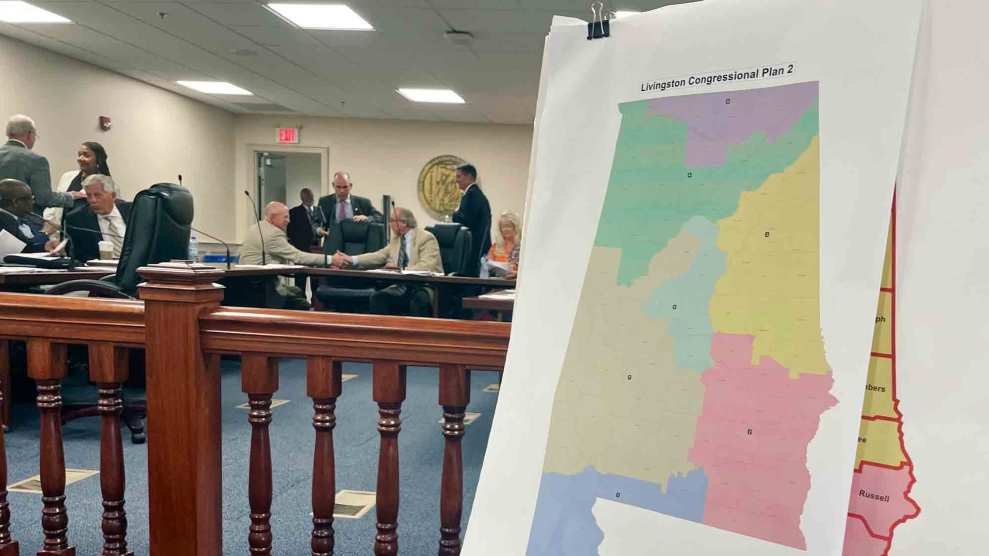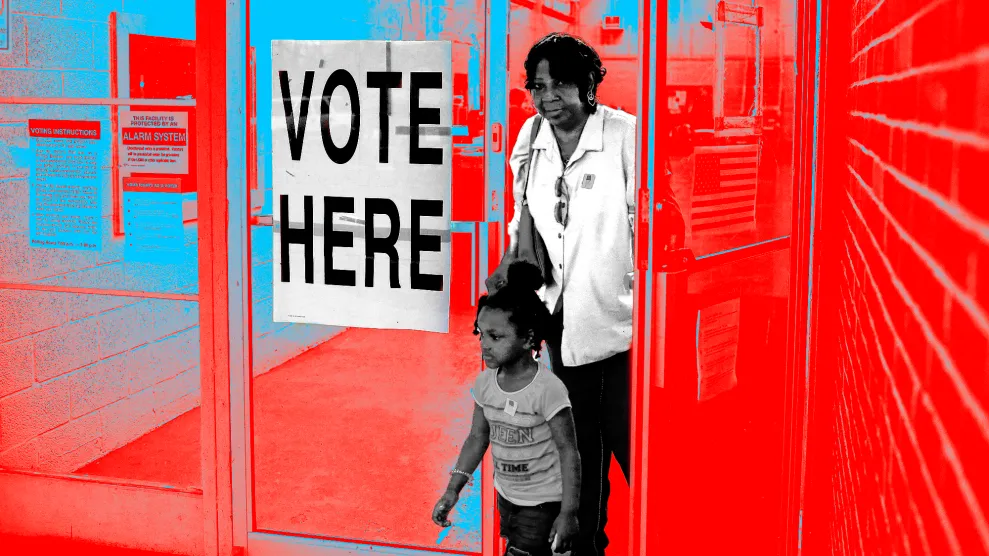
A map of a GOP proposal to redraw Alabama's congressional districts is displayed at the Alabama Statehouse on July 18, 2023. Kim Chandler/AP
A federal court struck down, for a second time, a racially gerrymandered congressional map in Alabama that denied fair representation to Black voters.
In early 2022, a three-judge panel that included two appointees of Donald Trump found that Alabama violated the Voting Rights Act by failing to draw a second majority-Black congressional district in the state. Alabama has a Black population of 27 percent, but just one of the state’s seven congressional districts was likely to elect a candidate favored by Black voters under the maps drawn by Alabama Republicans. In June, the Supreme Court, in a surprise victory for voting rights, affirmed the lower court’s ruling in Allen v. Milligan, paving the way for Alabama to draw a second majority-Black district.
But over the summer, Alabama Republicans flagrantly defied the orders of the federal district court and the US Supreme Court. Instead of drawing a new majority-Black district, the state legislature in July drew a seat that was only 40 percent Black and would have been easily carried by Trump, while lowering the Black population in the state’s lone majority-minority district. Alabama Republicans admitted they consulted with US House Speaker Kevin McCarthy in a bid to keep the seat red. “I did hear from Speaker McCarthy,” said state Sen. Steve Livingston (R), who sponsored the new map. “It was quite simple. He said, ‘I’m interested in keeping my majority.’ That was basically his conversation.” Alabama’s Republican governor Kay Ivey applauded the legislature for defying the federal courts. “The legislature knows our state, our people and our districts better than the federal courts or activist groups,” Ivey said.
This blatant disregard for federal law led the district court that originally invalidated the congressional map to do so again on Tuesday. “We do not take lightly federal intrusion into a process ordinarily reserved for the State Legislature,” the court wrote. “But we have now said twice that this Voting Rights Act case is not close. And we are deeply troubled that the State enacted a map that the State readily admits does not provide the remedy we said federal law requires.”
The judges used unusually pointed language to castigate Alabama Republicans for openly ignoring earlier court orders. “We are not aware of any other case in which a state legislature—faced with a federal court order declaring that its electoral plan unlawfully dilutes minority votes and requiring a plan that provides an additional opportunity district—responded with a plan that the state concedes does not provide that district,” they wrote. “The law requires the creation of an additional district that affords Black Alabamians, like everyone else, a fair and reasonable opportunity to elect candidates of their choice. The 2023 Plan plainly fails to do so.”
The court ordered a special master and a cartographer to draw new congressional maps in time for the 2024 elections. That will result in a potential pickup for Democrats, boosting their chances of taking back the US House. Similar litigation in other Southern states could also have a major impact on the 2024 election. A trial begins on Tuesday challenging racial gerrymandering in Georgia’s congressional maps. On Saturday, a state court ruled that Florida’s redistricting maps, championed by Ron DeSantis, discriminated against Black voters. A federal court could soon order the creation of a new majority-Black congressional district in Louisiana.
But the fight over the Voting Rights Act in Alabama is far from over.
Alabama has signaled it plans to challenge the constitutionality of Section 2 of the Voting Rights Act, buoyed by a concurring opinion by Brett Kavanaugh in the Milligan case, who joined the majority in striking down Alabama’s map but suggested that “the authority to conduct race-based redistricting cannot extend indefinitely into the future.”
The conservative majority of the US Supreme Court has not been friendly to voting rights, repeatedly gutting the Voting Rights Act. But, for once, the state of Alabama might have gone too far even for some conservative judges to tolerate.
















